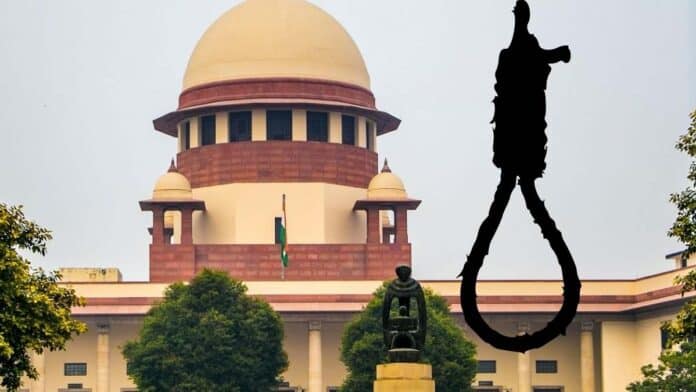The Supreme Court on Tuesday said it may consider setting up of a committee of experts to examine whether execution of death row convicts by hanging was proportionate and less painful and sought “better data” from the Centre on issues pertaining to the mode of execution.
A bench comprising Chief Justice D Y Chandrachud and Justice P S Narasimha, which was hearing a PIL seeking removal of the present mode of execution of death row convicts by hanging from the statute, made clear that it cannot direct the legislature to adopt a particular mode of sentencing condemned convicts.
“We cannot tell the legislature that you adopt this method. But you (PIL petitioner) can certainly argue that something may be more humane… In lethal injections too, the person really struggles. On what basis does the law commission say that lethal injection is not a lingering death. There have been great divergences on what chemicals are to be used too. What research is there,” the bench observed during the hearing.
On the issue of the panel, it said if there was any data either in India or abroad regarding alternate methods of executing the death penalty then it would be better to to form a panel which may consist experts from the National Law Universities, AIIMS doctors and scientists.
“We can have perspective on alternate methods (for executing the death row convicts). Or can we see whether this method (of hanging the convicts) satisfies the test of proportionality for it to be upheld? We must have some underlying data before we relook at it. You (Attorney General) can come back to us by next week and we can formulate a small order and constitute the committee. We can hear you on its remit (scope and ambit of the committee),” the bench said.
The bench asked Attorney General R Venkataramani to get more information on the impact of death by hanging, pain caused, and the period taken for such death to take place and availability of resources to effectuate such hangings.
The bench asked whether science is suggesting that the execution by hanging is still the “best method today or if there is another method which is more suitable to uphold human dignity”.
The bench has now posted the PIL for further hearing in May saying that it was matter for “reflection”.
Lawyer Rishi Malhotra had filed the PIL in 2017 seeking to abolish the present practice of executing a death row convict by hanging and replace it with less painful methods such as “intravenous lethal injection, shooting, electrocution or gas chamber”.
At the outset, Malhotra said that when a convict is hanged, his dignity stood lost which even in death is necessary and gave illustrations of other countries where other modes of execution are being followed.
Thirty six states in the US have already abandoned the practice of executing convicts by hanging.
“Our own armed forces law provides for two choices- either by shooting or by hanging. These provisions are missing in our CrPC (Code of Criminal Procedure) provisions. Death by hanging is neither quick, nor humane,” he said.
“The question of dignity is not under contest. Even the issue of minimum amount of pain is not in contest. The question which remains is what does science offer? Does it offer lethal injections? The judgement says no. Even in America it was found lethal injection was not right,” the bench observed.
Lethal injections may also cause painful deaths and may not be humane either, it added.
“When a death penalty is executed, it is executed in the presence of District Magistrate and Superintendent. Of course, there may be some reports. What do these officers’ reports of these officers say? Do they indicate the extent of pain in prisoners,” the bench asked the attorney general.
The top law officer said that he would come back with more information on the issue.
Earlier in 2018, the Centre had strongly supported a legal provision that a death row convict would only be hanged to death and had told the bench that the other modes of execution like lethal injections and firing were not less painful.
“Execution, as contemplated under section 354(5) of the Code of Criminal Procedure, is not barbaric, inhuman and cruel as well as in compliance with safeguard no. 9 of the resolutions adopted by the ECOSOC,” the Ministry of Home Affairs had said.
The counter-affidavit, filed by the joint secretary of the MHA, had said that death by hanging was “quick, simple” and free from anything that would “unnecessarily sharpen the poignancy of the prisoner”.
Lethal injection, which is believed to be painless, has also been contested on the ground that it may lead to uncomfortable death wherein the convict is unable to express his/her discomfort because of paralysis by the paralytic agent injected.
The affidavit was filed in response to the PIL which referred to the 187th Report of the Law Commission advocating removal of the present mode of execution from the statute.




